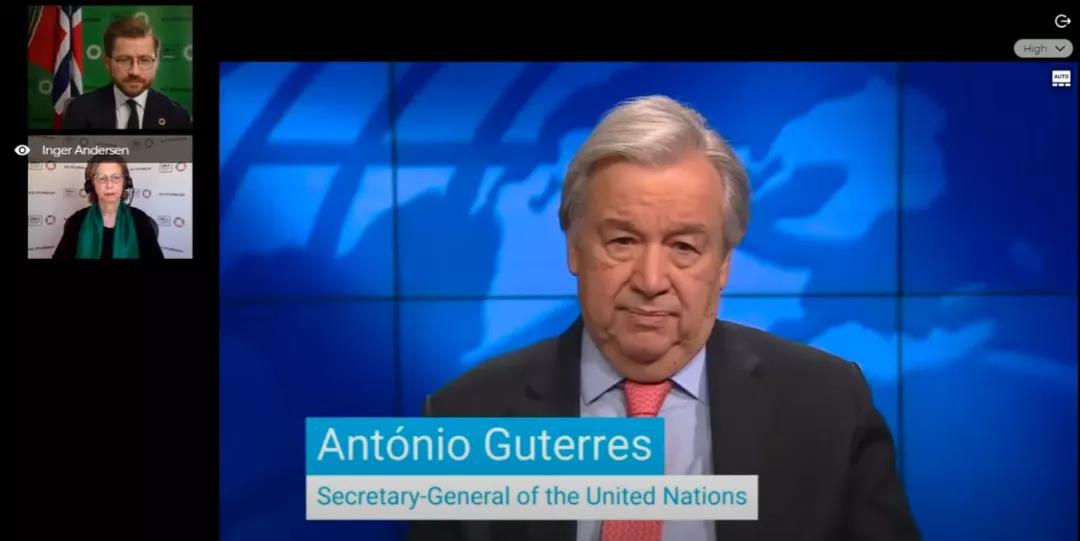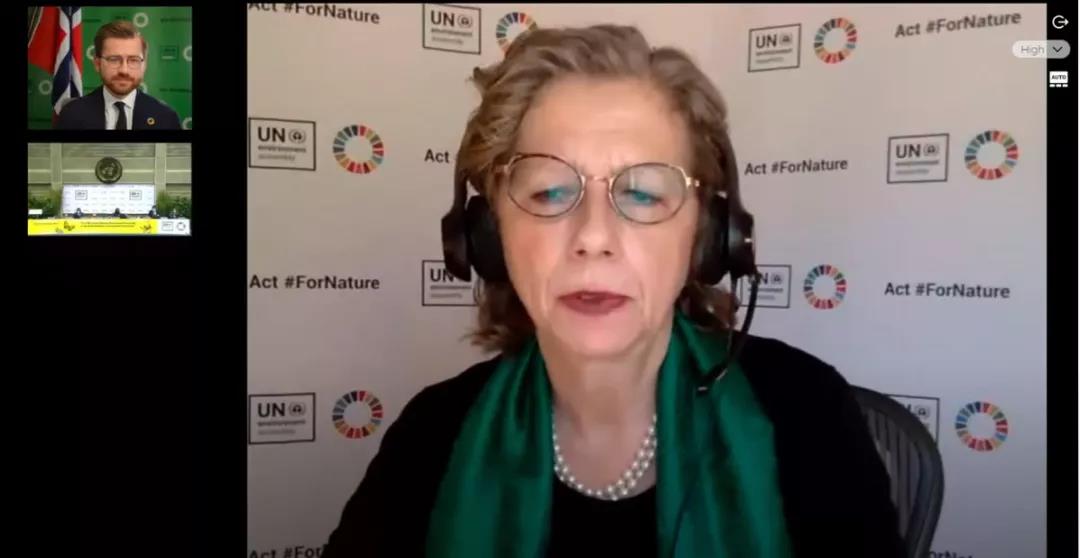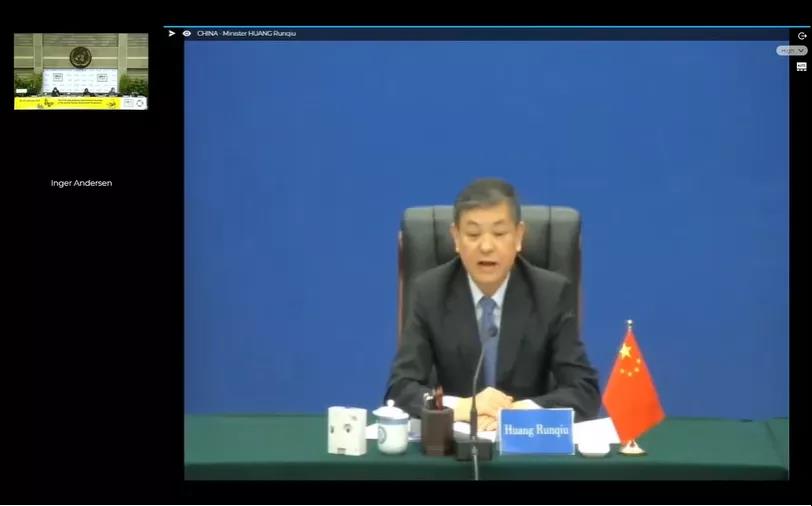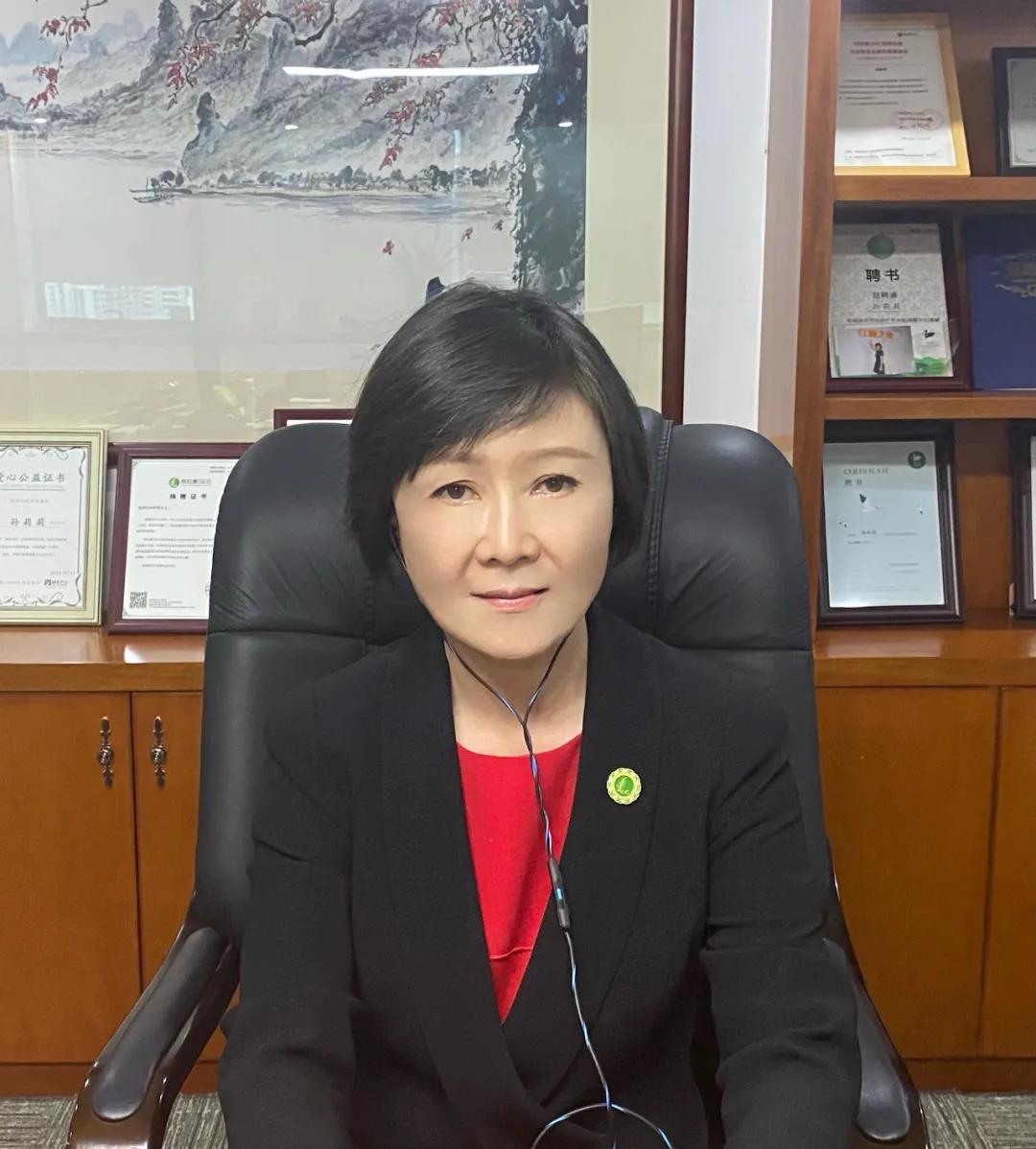2月22日-23日,第五届联合国环境大会在线上召开,来自150多个国家的1500多名代表和60多个国家的环境部长“云聚”一堂,围绕“加强自然保护行动,实现可持续发展目标”的主题,共商全球环境政策。作为仅有的2个民间社会代表之一(另一位是来自于印度的SonamWangchuk),阿拉善SEE生态协会会长孙莉莉在“领导者对话”会议上作了发言,这也是阿拉善SEE第一次在全球最高级别的政府间环境会议上作发言。

▲ 联合国秘书长古特雷斯在线上会议上讲话
联合国秘书长古特雷斯在开幕式上表示,2021年是我们重塑与自然关系的关键一年,要在2030年实现可持续发展目标,要防止生态系统崩溃。
古特雷斯强调,为实现2030年的碳排放减排目标,需要所有国家作出更具雄心的贡献,在即将于昆明举行的《生物多样性公约》第十五次缔约方大会(COP15)上,各国必须提出具体的目标和措施,来表明扭转物种和生态系统损失的决心。古特雷斯表示,“我相信,我们可以为全人类提供一个健康的地球,让它不仅能生存,而且能繁荣发展”。

▲ 联合国环境规划署执行主任英格·安德森在线上会议上讲话
联合国环境规划署执行主任英格·安德森(Inger Andersen)表示,当前全球面临三大危机,即气候危机、生物多样性和自然危机以及污染和废物危机。她说,必须让企业、投资者和环保业内人士承诺,使2021年成为我们与自然和平相处的一年。这意味着要支持绿色复苏,以摆脱新冠疫情的影响;也意味着要让更多国家为《巴黎协议》作出更有力的贡献;还意味着我们要加紧行动,加强全球团结,使我们能够在这些承诺的基础上再接再厉。

▲ 中国生态环境部部长黄润秋在线上会议上讲话
中国生态环境部部长黄润秋在发言中表示,人与自然是生命的共同体,气候变化、生物多样性丧失、环境污染三重危机叠加,“加强保护自然行动,实现可持续发展目标”刻不容缓。黄润秋强调,2021年是各方采取行动的关键性一年。《生物多样性公约》第十五次缔约方大会(COP15)将在我国昆明举办。大会主题“生态文明:共建地球生命共同体”,紧扣当前形势,为全球生物多样性治理指明了方向。我国作为东道国,正积极推进各项筹备工作,确保举办一届具有里程碑意义的大会。

▲ 阿拉善SEE生态协会会长孙莉莉在线上会议上讲话
孙莉莉表示,过去十年,人类在生物多样性保护上的20个目标,没有一个完全达成。所以,我们要在雄心与现实面前,寻求平衡。企业生产行为的绿色转型,有赖于市场需求的拉动,和生产技术的革新。我们将通过各种方式,积极投身于全球环境治理中,做出自然保护的承诺和行动。
此外,阿拉善SEE生态协会副会长常付田、薛健也在线上出席了本次会议。联合国环境大会是世界最高级别环境决策机制,每两年举办一届。本届大会的一大亮点是各国部长和高级别代表参与的高级别讨论“领导力对话”,对话聚焦可持续发展的环境维度,着重讨论如何通过保护及恢复环境来重建更具复原力和包容性的后疫情世界。
以下为阿拉善SEE生态协会会长孙莉莉演讲实录
“
尊敬的各位同仁:
我很高兴代表阿拉善SEE生态协会参加对话。
SEE是中国企业家群体参与环境保护的最大平台。我们凝聚了900多位企业家会员,开展行业自律,资助环保公益。我们资助了700个NGO,带动了6亿人次参与环境保护。
过去十年,人类在生物多样性保护上的20个目标,没有一个完全达成。所以,我们要在雄心与现实面前,寻求平衡。
首先,我想讲一讲,对未来全球消费和生产态势的判断。企业生产行为的绿色转型,有赖于市场需求的拉动,和生产技术的革新。一方面,消费转型的周期会比较长,难度较大。另一方面,技术变革,尤其是环保、新能源以及信息科技的发展,为生产过程的绿色化带来了机遇。围绕企业供应链管理,SEE在中国的建筑与房地产行业,设定绿色标准、践行绿色采购,年采购额达15亿美元,推动了几千家供应商的转型。
除此之外,公共政策对企业行为的引导和规制,至关重要。良好的财税金融政策和激励措施,会加快企业的绿色转型。
SEE还通过企业联盟的方式,为私营部门尤其是中小企业参与环境保护,提供新的路径。SEE加入了商业自然联盟等多个网络,将引导会员企业,做出自然保护的承诺和行动。
借此时机,我向全球的环境政治领袖们呼吁,把握当前机遇,在以下五个方面开展行动:
一、在制定经济政策时,应将生态服务价值和自然资本纳入核算体系。
二、加强国际、国内环境法治建设,尤其是加大执法和监督力度。
三、开展绿色金融实践和影响力投资,鼓励环境友好型和科技创新型企业的发展。
四、注重环境议题之间的协同增效,实践“基于自然的解决方案”。为原始森林、红树林等碳密度最高、生物多样性最丰富的生态系统,设定“零损失”目标。
五、加强环境信息公开和数据的共享。
最后,我们重视UNEP在整合私营部门资源、推广环境科学结论、推动全球环境治理中,发挥的基础性作用。因此,我们大力支持联合国“科学-政策-商业”论坛以及《全球环境展望》的相关工作。作为亚太区主要群体和利益攸关方的成员,我们将一如继往支持UNEP在中国以及在全球其他地区的工作。
以下为英文版发言稿
Ms. SUN Lili’s Speech in the Leadership Dialogue A
(Run parallel with the Chinese version)
Distinguished delegates:
I am delighted to participate in this dialogue on behalf of Society of Entrepreneurs and Ecology (abbreviated as SEE).
SEE is the largest platform for Chinese entrepreneurs to participate in environmental protection. More than 900 business leaders joined the course via voluntary industry environmental actions and philanthropic donations. We have supported more than 700 environmental NGOs and attracted 600 million person-time involved in different environmental actions in China.
The immediate post-pandemic period is a time for healing. Whereas the route to a full recovery is filled up with uncertainty. It is astute to deliberately set pragmatic environmental goals for a foreseeable future. Over the past decade, none of the 20 Aichi targets of biodiversity have been fully met. So we have to balance our environmental ambition with reality.
The first part of my talk is about the outlook of global consumption and production.
The prominent two drivers for industry’s green transition are the market demands and the mode of production. I anticipate the pandemic will have a short-lived impact on the conventional consumer demands. It will take longer and dragging efforts to achieve transformative changes in consumption.
On the other hand, technological innovations, like renewable energy and Information and Communication Technology, has brought opportunities for the greening of production processes. The enhanced supply chain management and the reshuffle of global value chain, enabled SEE to set green standards and practice green procurement in China's building and construction sector. By forcing thousands of upstream suppliers to improve their environmental performances, the annual green procurement volume has reached $1.5 billion in 2020.
Beyond voluntary actions, the public policy plays a crucial role in guiding and regulating enterprise’s behavior. Sound fiscal and financial policies combined with proper incentive measures will accelerate the green transformation of enterprises, who may otherwise be boggled at trade-offs between cost and social impacts.
However, individual business’s impact on environment is limited. Therefore, SEE, as a network of enterprises, provides a new way for the engagement of multiple industries, especially for small and medium sized enterprises. SEE has joined a number of alliances, including the Business for Nature, to encourage our member companies to make conservation commitments and take actions.
Distinguished delegates, it is our earnest intention to call on environmental political leaders around the world, to seize the opportunity to act now in the following five areas:
1. To value ecosystem services and natural capital when formulating economic policies.
2. To strengthen international and domestic rule of law on environment, with unhindered law enforcement and independent supervision.
3. To promote green finance and impact investment, supporting environmental friendly and innovative businesses.
4. To build synergies when dealing with multiple environmental issues through Nature-based Solutions (NbS). Adopt a “NO LOSS” goal for the most carbon-dense, high biodiversity ecosystems including explicit attention to primary forests, peat forests, mangroves and other coastal ecosystems.
5. To strengthen pollution information disclosure and environmental data sharing in the digital era.
The last but not the least, SEE values the fundamental role played by UNEP in mobilizing private sector resources, building the link between environmental science and policy, and advancing global environmental governance. We therefore strongly support the work of the Science-Policy-Business Forum and the Global Environment Outlook. As a member of Major Groups and Stakeholders in the Asia-Pacific region, we will continue to support UNEP's work in China as well as in the rest of the world.
Thank you very much!